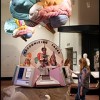“The real voyage of discovery consists not in seeking new lands but seeing with new eyes.” Marcel Proust
Have you ever caught yourself saying, “I love catching up with my old school buddies, it’s so easy to be myself in their company”? Or, “Felt so miserable at that party, making polite conversation with bunch of superficial people.” It transpires that we are often not our true selves in the company of others – subconsciously and repeatedly wearing masks that project a certain image of us to the world. We seem to have a collection of these masks that habitually surface, intending to best serve our self-interest, based on the need of our immediate environment. These masks come in varied shapes and colors like, the aggressor, the conformist, the nice guy, the shy one, etc. Only when we are able to bring these masks into our active awareness and deal with them, can we be ourselves and experience the freedom that brings.
We acquire these masks from various experiences through life – those gained during our childhood being the most notable and lasting ones. It’s our primal instinct and desire to be loved. This is such a deep longing that right from our childhood, we are constantly adapting to our environment and building different strategies, so we can better fulfill this need. Depending upon what seems to work, meaning specifically what helps gain our parents’ love during our early years, we subliminally begin to cement those strategies into our psyche. Some of these become so deep rooted that as adults, we see them as an integral part of our personality – acknowledging it with comments like, “this is the way I am and it’s hard for me to be any other way”. As bestselling author, John Gray explains in “What you feel, you can heal”, this is how it works. If we were recognized for exceeding our parents’ expectations, say at school, we can grow up believing that being a high performer is the real ticket to be loved. As a result, one may always aspire, and even go to great lengths, to exceed others’ expectations, be it one’s supervisor, peers, or spouse. Falling short of our own expectations in any way then is a source of disappointment and an opportunity to blaming ourselves. Also, with this approach, we have high expectations of others and can be very judgmental of them.
Similarly, if we were loved and encouraged every time we followed our parents’ directives, we can easily grow up being a conformist, believing that it would not be in our self-interest to go against the norm in any group – a family, social circle or an organization. Similarly, we could play the diplomat, keeping our true feelings to ourselves but seeking to create a congenial atmosphere in a group; the reserved one, always hiding our true selves in the belief that we are not lovable anyways; the poor me, believing in the notion that only when I am in deep trouble and wronged can I attract others’ attention and love; the aggressor; for whom anger and show of superiority is the way to get noticed; the critic, constantly finding faults with others in order to hide their own inadequacies; the bragger, where lack of self-esteem leads to eulogizing about oneself in the hope of being loved and admired.
These masks get hard wired in our personality and show up in every aspect of our life, including at work and in our relationships. A high performer belief system may result in a workaholic or a perfectionist; a poor me mentality may constantly attract trouble – physical or emotional; a critic is never happy with the way things are in any setting and so forth. As these patterns are accompanied by suppressing our true feelings, they create ongoing emotional baggage in our lives. There’s always then an inner sense of incompleteness, and we are unable to fully experience an emotionally satisfying life.
“There is but one cause of failure and that is a man’s lack of faith in his true self.” William James
Despite our subconscious behavior patterns, we can free ourselves from these limiting beliefs and tendencies. This requires making a conscious choice to be true to our feelings and being honest in all our interactions. At a deeper level, this entails connecting with our pure inner self and realizing that we are truly worthy of being loved, and are capable of fully loving others. That then provides us the courage to express our true thoughts and feelings, without the fear of being judged. Social interaction is such a key part of human experience that social neuroscientists now believe that as many as four out of every five thoughts we have are in the context of relating to others. Further, research by Richard Boyatzis, an Emotional Intelligence expert, highlights how fear of social rejection is one of the three most common causes of human stress. A commitment to being authentic in all our interactions can liberate us – feeling confident of being lovable allows us to not suppress our emotions, making us emotionally healthy and resilient. As Mark Twain said, “If you tell the truth you don’t have to remember anything.” It also supports us in being more open to seeking others’ help and be willing to be vulnerable, which in turn, may make us even more endearing.
Let me share a couple of quick examples from my coaching experience here. A senior executive, who wanted to work on his relationships, was described by his colleagues as the critic – very controlling, had high expectations of them, and dealt with every shortfall with harsh words. As he consistently received negative feedback about his relationships and felt highly stressed from his work life, he was committed to make some real changes. As he became more self-aware, he started to notice the underlying beliefs for his difficult behavior – felt it was his egoistic desire to be right, perfectionist nature, and a deep desire to succeed. As we worked together, he started to shift his expectations from seeking perfection to more wholesome progress; started to better listen to others and put their agenda before his own; became more comfortable with his true self and less judgmental of others – accepting himself as he was and others as they were; overall, becoming more authentic in his listening, sharing, and conduct. Guess, authentic leaders realize that the power lies not in being right, but in being real.
Another client of mine was always striving to be the nice guy, trying to find a suitable compromise to resolving any friction between his parents and his wife. While this served him alright in the initial years, over time, he started to appreciate that this wasn’t really working – his parents expressed always feeling short changed; his wife felt her point of view was never fully respected; the client himself felt stifled constantly searching for convenient solutions that could somehow please everyone. Paying attention to this, somewhere he recognized the need to begin expressing his honest thoughts and feelings to all parties – this meant bringing the problems of family disconnects in the open for all to see rather than hide them. As he gathered the courage to candidly confront the problems, the family collectively decided to take on some hard decisions – resulting in the client feeling relieved, and everyone feeling comfortable with the decisions.
As is evident in these examples, this process kind of involves two steps – knowing myself and then, choosing to be myself. Knowing myself revolves around building a deeper understanding of our tendencies to hide behind various masks and being willing to examine them. As long as there is friction in our relationships and a sense of incompleteness or dissatisfaction in our hearts, we need to remain open to examining ourselves and our inner belief systems. A willingness to dive deeply into our core leads to realizing who we are and how whole, complete and perfect we all are – and that raises our ability to love ourselves as well as to stop doubting our worthiness to receive others’ love. Being myself then is about taking responsibility towards overcoming our habitual traits and building the capacity to express ourselves fully and honestly. This means being mindful of our choices at all times and choosing to being totally authentic without being fearful of the outcomes of our words and actions. Being myself eventually shifts us away from the inner emotional turmoil and towards feeling lighter, liberated and happier.
Related Search Terms:
How to improve Self esteem /improve self confidence /building self confidence











 Can’t Go Outside? Try Going Inside
Can’t Go Outside? Try Going Inside Life Hack: Consider Shifting From Fixed To Growth Mindset
Life Hack: Consider Shifting From Fixed To Growth Mindset Is Extroversion Overrated?
Is Extroversion Overrated? The Bane Of Modern Society: Excessive Individualism
The Bane Of Modern Society: Excessive Individualism Where is Our Mind Located…and its Powerful Significance!
Where is Our Mind Located…and its Powerful Significance!
My own last blogpost is another great example that would fit well with your post. I grew up known by 2 different names depending on who I was with at the moment. It caused me to wear many masks along the way before figuring it out, that’s for sure.
Excellent post, thank you. You caused me to consider some things I hadn’t thought of before.
The real journey in life is to continually and constantly keep discovering one-self. Satisfaction, thence becomes a pro-active rather than reactive end. The means vary : doing both societal and self fulfilling propositions plus of course the transactory nature of interacting with colleagues’n’relatives, grooming sub-ordinates’n’children and continuing to get good-will by way of 2-way exchanges with bosses/spouse/parents. Draw a circle around a picture of yourself and put in place compartments for the top 50 relationships you enjoy plus the 10groups of people u mostly interact with. Presto, there is a semblance of order in this warm-fuzzy (and sometimes hot??) area of relationships/self!
I seldom leave comments on blog, but I have been to this post which was recommend by my friend, lots of valuable details, thanks again.